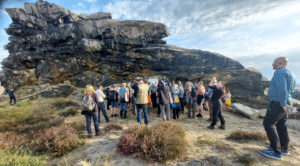Project 2446 my: Cascading Hazards and Mitigation Project (CHAMP)
PATA is the most significant workshop on Paleoseismology, Active Tectonics and Archaeoseismology of the INQUA – TERPRO (Terrestrial Processes, Deposits & History) commission.
Abstract
The goal of the CHAMP multi-year INQUA project is to hold PATA workshops in regions where scientists have been largely underrepresented in the international hazards community. South America, Central America, and the Middle East are also regions that are vulnerable to cascading hazards with large populations at risk. The project aims to organise three international PATA meetings and one field school in these regions.
The PATA meetings have a long history, dating back to 2009, providing a unique platform for participants to share earthquake hazard data from around the world and to deepen their understanding of diverse tectonic settings through field trips.
For the first time in South America, the 11th version of this meeting – PATAChile2024 was realized in Chile, at Los Andes, between October 6-11, 2024. The meeting included three intra-meeting fieldtrips, two of them realized at the San Ramón and Cariño Botado thrust faults, and one along the coastal region of Central Chile for paleotsunami evidence. In addition, pre-meeting and post-meeting field trips were also carried out, realised between October 3-6 (along the coastal region of the Atacama Desert) and October 12-14 (an Andean transect towards the Mendoza region in Argentina), respectively.
PATAChile2024 hosted 80 people from the Americas, Africa, Europe, Asia, and Oceania, with 77 work contributions presented during the meeting, encompassing research fields in earthquake geology and active tectonics, including neotectonics, paleoseismology, paleotsunami, archaeoseismology, and seismic and cascade hazards.
The extended abstracts were compiled, edited and published in the “Proceedings of the 12th International INQUA meeting on Paleoseismology, Active Tectonics and Archaeoseismology PATA Days 2024” (Easton and González Eds., 2024, http://doi.org/10.34720/fc3d-mp19), available here.
The conference was sponsored by the International Union for Quaternary Research (INQUA), the Geological Society of Chile, the National Disaster Prevention and Response Service (SENAPRED, Chile), and the National Seismological Center (CSN, Chile). Administrative support was provided by the Department of Geology of the Faculty of Physical and Mathematical Sciences of the University of Chile.
Travel grants for students and early career researchers were provided by the CHAMP (INQUA) and OLLIN (IGCP, UNESCO) projects. Outreach activities conducted during the meeting included the participation of children, teachers, and representatives from local schools in the San Esteban locality, at Los Andes, enabling their interaction with the international community of Earth scientists. In addition, participants of the PATAChile2024 had the opportunity to be part of a Mapuche ceremony held on Calán hill, at Santiago.

Objectives:
- Train Early-Career and Developing-Country Researchers in best practices for seismic hazard assessment;
- Encourage holistic research that addresses cascading hazards and multi-risk interactions;
- Offer practical sessions on how to communicate seismic hazard science effectively to policy-makers and the public;
- Showcase real-world examples of building collaborative networks between scientists, engineers, and stakeholders—drawing on experiences from PATA Workshop locations;
- Publish and share research outcomes presented at the meetings to ensure broad accessibility and lasting impact.
Project leaders:
- Tina Niemi, University of Missouri-Kansas City, USA
- Gabriel Easton, Universidad de Chile, Chile
- Yann Klinger, Institut de Physique du Globe de Paris, France
- Shreya Arora, Bates College, USA
Meeting Website
Latest developments
View moreLatest developments Loess Fest 2026
Loess Fest 2026Echoes of the past: Loess, climate and human interactions during the Pleistocene will take place between 7-11 September in Krapets, Bulgaria
 Podcast INQUA India 2027
Podcast INQUA India 2027Quaternary is the age when modern recognisable humans started inhabiting this planet. All over the world scientists are engaged in studying various aspects of human evolution. Once every 4 years scientists from all across the…
 PALCOM-supported sessions
PALCOM-supported sessionsINQUA PALCOM interactive bulletin of scientific sessions for the INQUA Congress 2027
 New QP Issue Out!
New QP Issue Out!QP Issue 39 December 2025 is now available online!
 INQUA 2025 Sir Nicholas Shackleton Medal
INQUA 2025 Sir Nicholas Shackleton MedalThe INQUA 2025 Sir Nicholas Shackleton Medal recipient is Prof. Dr. Nicole Khan from the University of Hong Kong (Hong Kong)
 7th International Palaeontological Congress – IPC7
7th International Palaeontological Congress – IPC7The 7th International Palaeontological Congress (IPC7) will be held between 30 November – 3 December 2026 in Cape Town, South Africa


